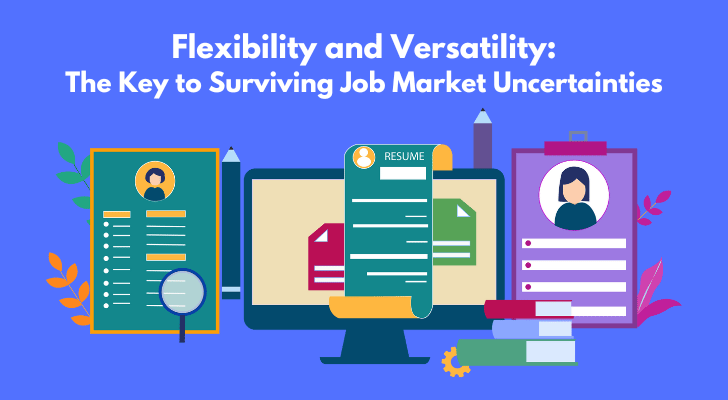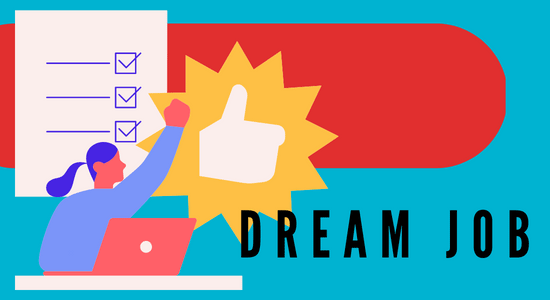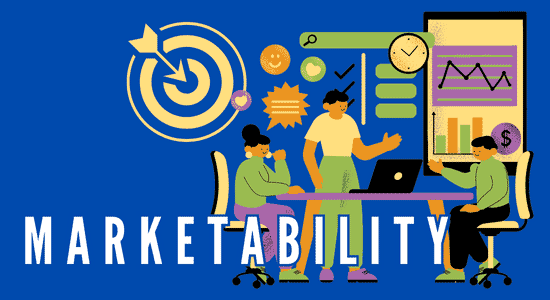The job market is constantly evolving, and we are now expected to keep up with the changes. Because the dream job you worked so hard for may become obsolete sooner than you think. You need to have a flexible attitude and versatile aptitude - if one thing doesn’t work, take something else. And if that stops working, look for another.
Recruiters used to see us as unreliable if we changed our job every few years. We used to be told that we were unambitious if we didn’t have a career goal. However, those days are gone - there is little point in establishing a career goal since any career path may be eliminated by new industry trends.
So stay adaptable and be willing to learn new skills that will help safeguard your future employability. Let’s explore why equipping yourself with flexibility and versatility is the key to surviving job market uncertainties and how you can future-proof your career by being adaptable and versatile in any industry.

Flexibility vs. Versatility
Flexibility refers to the ability to adapt to changes in circumstances or requirements. It often involves being open to new ideas and being able to change plans or methods when necessary. A flexible person can bend or adjust their approach to fit different situations without losing focus or becoming too rigid.
Versatility, on the other hand, refers to the ability to perform a variety of tasks or roles competently. A versatile person is able to apply their skills and knowledge in different contexts and can handle different types of challenges. A versatile person may be able to work in multiple areas or fields, or they may have a range of skills within a particular area.
In summary, flexibility is about being adaptable and open-minded, while versatility is about having a range of skills or abilities that can be applied in different contexts. Both are valuable traits in the workplace, as they enable individuals to respond effectively to changing situations and take on new challenges.
What It Means To Be Versatile in Your Career
In this crowded market, it's hard to differentiate yourself from the competition. When running a business, being versatile means having the ability to adapt and adjust to changes and challenges that arise in the marketplace. If you’re working for someone, you’re expected to have the willingness to learn and take on new tasks and responsibilities outside of their speciality.
It means having a diverse range of skills, resources, and strategies that can be applied in different situations, whatever you do.
In practical terms, being versatile could mean:
- Being open to new opportunities and technologies, and being willing to pivot your business model or systems if needed.
- Having a broad skill set or diverse team, so that you can handle different types of tasks and projects.
- Being able to work with different types of employers, clients, and suppliers, and adapting your approach to compromise.
- Having a contingency plan in place for unexpected events, such as natural disasters or economic downturns.
- Being willing to experiment and try new ideas, while also learning from failures and mistakes.
To sum up: being versatile doesn't just open doors for new opportunities but provides job security by ensuring that individuals always have something unique about themselves even if automation replaces simple tasks.
Your Dream Job May Become Obsolete

Many people aspire to land their dream job, but what happens when that job becomes obsolete? As technology advances and industries change, it's important to realize that even the most sought-after professions may not be in demand forever.
Take for example the rise of automation and artificial intelligence - jobs in manufacturing, transportation and even healthcare may soon become automated. This means that individuals who have dedicated their entire careers to these fields may find themselves out of work.
It's not just technological advancements either- economic downturns or changes in the consumer behavior can also impact certain industries. For instance, COVID-19 has drastically impacted the hospitality and tourism industry with many businesses closing down permanently due to financial losses.
So what can you do if your job becomes obsolete? One solution is to stay adaptable and continuously learn new skills so you can transition into a new field if necessary. It's also important to keep up with industry trends and understand where potential opportunities lie.
In short, while it’s great to pursue your passion career-wise, being flexible about which paths you take is almost as critical as having an objective plan on how you will get there. Adaptability ensures preparedness for anything life throws your way - especially when it seems like we are living through times of uncertainty more than ever before!
You Cannot Future-Proof Your Career
While new jobs and industries are also emerging that require human skills and expertise, AI is definitely reshaping the job market and there is no longer such thing as a future-proof career.
We need to assume that AI and automation are becoming a panacea for all work-related challenges sooner or later. Not just for repetitive and routine tasks but complex decision-making, creative thinking, and emotional intelligence will soon be managed by AI.
Until a few years ago, it was said that jobs that require skills in healthcare, education, and social services, were less likely to be automated. They can be now.
With that said, AI also creates new job opportunities. For example, the development and maintenance of AI systems require specialized skills and knowledge that only humans possess - for now.
We never know what kind of jobs will require human skills and expertise in a few years' time. That’s why we should at least consider taking on projects outside of our normal job responsibilities. Being proactive about learning is something we can do to prepare for the worst-case scenario.
How to be Flexible and Versatile
Here are the things to do to adapt to the constantly changing job market and remain competitive.
- Develop a diverse skill set: Instead of specializing in just one area, consider developing a diverse skill set that encompasses a range of disciplines. This will make you more adaptable and versatile and increase your chances of finding new job opportunities.
- Embrace lifelong learning: In today's fast-paced world, it's important to continuously learn and acquire new knowledge and skills. This could involve taking courses, attending workshops, or participating in online training programs.
- Network and build relationships: Building a strong professional network can help you stay abreast of industry trends and connect with potential job opportunities. Attend events and spend a good few hundred dollars to join professional bodies to connect with people in your field.
- Be open to change: Being adaptable requires a willingness to embrace change and try new things. Be open to new ideas and ways of working, and be willing to step outside of your comfort zone.
- Take on new challenges: Seek out opportunities to take on new challenges and responsibilities, even if they are outside of your area of expertise. This can help you develop new skills and experiences and increase your versatility.
- Stay current with technology: As technology continues to evolve, it's important to stay up-to-date with the latest tools and software in your field. This will make you more marketable and adaptable in the job market.
Increase Your Marketability

Increasing your marketability is essential in today's job market and business environment because;
- Competitive job market: In today's job market, competition for top positions can be fierce. By increasing your marketability, you can differentiate yourself from other candidates and increase your chances of landing a job.
- Career advancement: To advance in your career, you need to demonstrate that you have the skills and knowledge to take on new challenges and responsibilities. Increasing your marketability can help position you for promotions or new opportunities within your organization.
- Business success: If you are a business owner or entrepreneur, increasing your marketability can help you attract and retain customers, stand out from your competitors, and grow your business.
- Salary negotiation: When negotiating your salary or compensation package, it's important to demonstrate your value and marketability. The more in demand your skills and expertise, the more negotiating power you have.
- Personal growth: By continuously learning and developing new skills, you can enhance your personal and professional growth. This can lead to increased job satisfaction and a sense of fulfillment in your career.
In short, you really need to stand out from your competitors, demonstrate your value, and position yourself for career advancement and personal growth.
So how can you increase your marketability in business and job search?
This hidden knowledge used by the elites will let you generate wealth and prosperity

Develop your skills:
Take courses, attend workshops, or participate in online training programs to develop your skills and stay current in your field. The more specialized and diverse your skill set, the more marketable you become.
Build a strong professional network:
Attend industry events, join professional organizations, and connect with people in your field on social media to build relationships and stay up-to-date on industry trends.
Showcase your accomplishments:
When applying for jobs or promoting yourself in business, highlight your accomplishments and successes. Share specific examples of how you have contributed to the success of past projects or companies.
Be adaptable:
In today's constantly changing job market, it's important to be adaptable and flexible. Be willing to take on new challenges and learn new skills to stay competitive.
Develop a strong personal brand:
Create a professional website or online portfolio to showcase your skills and accomplishments. Maintain an active social media presence that aligns with your personal brand.
Stay current with technology:
As technology continues to evolve, it's important to stay up-to-date with the latest tools and software in your field. This will make you more marketable and adaptable in the job market.
Consider further education or certifications:
Obtaining additional education or certifications in your field can increase your marketability and demonstrate a commitment to professional development.
Build Your Marketing Skills Through a Business Online
Start running your own home business online using your spare time. Because your side hustle can provide you with opportunities to learn basic marketing skills. You are essentially marketing and promoting your products, so you will learn some skills through your home business online.
- Product positioning: You will need to learn how to position your products in the market to differentiate them from your competitors.
- Branding: You will need to create a brand for your business and learn how to communicate your brand's values, personality, and benefits to potential customers.
- Targeting: You will need to learn how to identify and target your ideal customers based on their demographics, interests, and behavior.
- Messaging: You will need to develop a clear and concise message that resonates with your target audience and communicates the benefits of your products or services.
- Social media marketing: You will need to learn how to use social media platforms such as Twitter and Instagram to promote your business and engage with potential customers.
- Content marketing: You will need to learn how to create compelling content such as blog posts, videos, and infographics that educate and inform potential customers about your products or services.
By running a home business online, you will have the opportunity to learn and apply these marketing skills in a practical setting, which can help you develop your marketing knowledge and expertise.
Start with Affiliate Marketing
Affiliate marketing can help you become more flexible and versatile in your approach to marketing. Affiliate marketing requires you to adapt to the constantly changing digital landscape and stay up-to-date with new marketing strategies and tactics.
As an affiliate marketer, you will have the opportunity to work with a variety of different companies and products, each with its own unique marketing needs and challenges. This will require you to be versatile in your marketing approach and to develop a range of skills and techniques to effectively promote these products.
Like any other industry, the affiliate marketing industry is constantly evolving, with new technologies and platforms emerging all the time. To be successful in affiliate marketing, you need to be willing to learn and adapt to these changes and to continually improve your marketing skills and techniques.
Through affiliate marketing, you will develop the flexibility and versatility you need to succeed in the rapidly changing digital marketing landscape. By continually learning and improving your skills, you can stay ahead of the curve and achieve success as an affiliate marketer.

 Positive Vibes
Positive Vibes  (@cybercashworldwide)
(@cybercashworldwide)